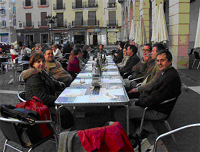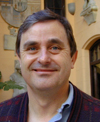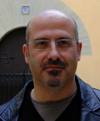 |
|||||||||||
|
|||||||||||
|
|||||||||||
|
On 1-3 December 2005, Spain held its first Workshop on the ILC in the "palau Ducal" in the city of Gandía, province of Valencia (Spain). About 70 researchers attended the meeting and all high energy physics laboratories were represented. This meeting aimed to present the ILC and its progress to the Spanish Particle Physics community. Some groups had individually already expressed interest in the ILC, but they determined that a national network was necessary.
Linear collider expertise already exists in Spain. There was an early interest in the Research Center on Energies, Environment and Technology (CIEMAT) in Madrid, a technically oriented institution. They developed within linac collaborations, such as TESLA500, an excellent know-how on superconducting magnets. CIEMAT also contributes to XFEL and CLIC. In the (Physics Institute of Cantabria (IFCA), some physicists belong to the Silicium tracking for the Linear Collider Collaboration (SiLC). At IFIC, there are experts in Silicium trackers, machine and Machine Detectors Interface.
Whether to join the ILC project or not will not be imposed by a national decision and each group will decide individually whether they wish to participate to the project or not. "The ILC is a very challenging and interesting project, and our funding agency supports interesting projects. If the labs want to follow the international effort, they will be funded", said Espriu. During the workshop, the main experimental challenges of the future linear collider were presented to the audience by experts of the fields, together with the theoretical context of the project. "There will be a second meeting in the first half of 2006, where hopefully we will know more about the conclusions of each group's internal discussion. At least two groups should seriously think about joining the international effort on the ILC", added Fuster. Photo page
--Perrine Royole-Degieux |
|||||||||||
| © International Linear Collider |


